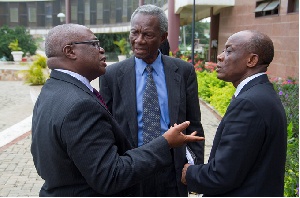The continuous slide of the cedi is pushing businesses to the brink, investment advisory firm InvestCorp has said -- warning that without ‘broad-based solutions’ that strengthen private sector competitiveness as well as investment and capital protection, most businesses will go down the sinkhole.
The performance of the cedi against major trading currencies in the first half of the year has largely been abysmal, as it lost almost a quarter of its value against the US dollar during the period under review.
At the beginning of the year, a dollar exchanged at GH¢3.2, but as at June 17, 2015, it was trading at GH¢4.2 -- a 24.2 percent depreciation in less than six months.
In its May 2015 economic report, the investment advisory firm said: “An array of developments over the past decade clearly show that there is a structural shift in Ghana’s currency market; and we believe businesses, commercial banks and policymakers must not overlook the recent risk dynamics”.
The report described the challenge as enormous, while adding that broad-based solutions are needed to ensure the country’s private sector competitiveness as well as investment and capital protection.
In addition to the depreciation, businesses are reeling under the impact of unreliable power as well as costly utilities, which together sum up the high cost of operations many businesses have to endure.
Depreciation pressures
According to InvestCorp’s research, unlike the traditional depreciation pressures that reflect fiscal and current account deficits, today’s key structural dynamics include opening-up of the country’s capital account to foreign portfolio investors as well as the issuance of Eurobonds for broad budgetary support.
“A healthy argument for Ghana to access the international capital market is to ease pressures on domestic interest rates; but with current account vulnerabilities and relatively small international reserves, the volatility of the currency has been worsened…especially in the wake of debt pressures and weak commodity prices,” the report said.
And due to significant foreign debt exposure, the report said interest rates will have to increase to compensate investors for currency risk expectations -- regardless of whether the depreciation is healthy for the current account.
“This conflict must be understood in the context of the current challenges; and there is need for confidence, policy credibility and partnership among business, commercial banks and policymakers if the country is to achieve sustained progress in stabilising the currency,” said Sampson Akligoh, InvestCorp’s Managing Director who authored the report.
While there is an urgent need for the country to reduce its deficit, Mr. Akligoh added: “We think practically it will be more gradual than planned as the key sources of the deficit are structural”.
The persistent fall in commodity prices on the world market has contributed to the country’s low reserves, and the investment advisory firm wants the central bank to support banks to develop relatively cheap and easy hedge-products for businesses to limit foreign currency hoarding.
Business News of Saturday, 20 June 2015
Source: B&FT













